Literary Analysis Essay
Literary Analysis Essay Outline


Literary Analysis Essay Outline Guide with Examples
Published on: Aug 22, 2020
Last updated on: Mar 25, 2024

People also read
Literary Analysis Essay - Step by Step Guide
Interesting Literary Analysis Essay Topics & Ideas
Share this article
Writing a literary analysis essay may seem intimidating at first, but we're here to simplify the process for you. In this guide, we'll walk you through the steps of creating an effective outline that will enhance your writing and analytical abilities.
Whether you're a seasoned student or new to literary analysis, mastering the art of outlining will help you organize your thoughts and express your ideas with clarity and precision.
Let's dive in!
On This Page On This Page -->
The Basics of Literary Analysis Writing
Before diving into the specifics of the outline, let's grasp the fundamental elements of a literary analysis essay .
At its core, this type of essay requires a thoughtful examination and interpretation of a literary work. Whether it's a novel, poem, or play, the aim is to analyze the author's choices and convey your insights to the reader.
The Significance of an Outline
An outline is important for two reasons: It helps you organize your ideas and allows readers to follow along easily.
Think of it as a map for your essay. Without structure, essays can be confusing. By using an outline, you ensure that your writing is clear and logical, keeping both you and your readers on track.
Literary Analysis Essay Format
Letâs take a look at the specific and detailed format and how to write a literary analysis essay outline in simple steps:
Outline Ideas for Literary Analysis Essay
Here are sample templates for each of the outlined ideas for a literary analysis essay:
Five Paragraph Essay
This format is a traditional structure for organizing essays and is often taught in schools. It consists of an introduction, three body paragraphs, and a conclusion. Each body paragraph focuses on one main point or argument.
MLA Formatted Graphic Organizer
This format is designed to help organize your ideas according to the Modern Language Association (MLA) formatting guidelines. It ensures that your essay is properly structured and formatted according to MLA standards.
Compare and Contrast Essay on Two Texts
This format compares and contrasts two texts, highlighting similarities and differences. This is a common method used to analyze literature. There are two common methods: point by point and block method.

Tough Essay Due? Hire Tough Writers!
Literary Analysis Essay Examples Outline
Letâs take a look at the literary analysis essay outline examples in easily downloadable PDF format:
Literary Analysis Essay Outline Middle School
Literary Analysis Outline Graphic Organizer
Critical Analysis Essay Outline Example
Character Analysis Essay Outline
Literary Analysis Essay Topics
Here are some literary analysis essay topics you can take inspiration from:
- Analyze the corrupting influence of power in Shakespeare's "Macbeth."
- Explore the symbolism of the green light in "The Great Gatsby" and its connection to the American Dream.
- Examine Holden Caulfield's journey of self-discovery and identity in "The Catcher in the Rye."
- Understand the use of magical realism in "One Hundred Years of Solitude" and its reflection of Latin American culture.
- Unravel the impact of race, class, and social hierarchy on moral justice in "To Kill a Mockingbird."
- Investigate feminist themes and gender roles in "Jane Eyre": Independence, equality, and the quest for autonomy.
- Examine the theme of fate versus free will in Sophocles' "Oedipus Rex" and its tragic consequences.
- Analyze the allegorical critique of totalitarianism in George Orwell's "Animal Farm."
- Explore survival and resilience in "Life of Pi" through the protagonist's journey of faith and self-discovery.
- Understand existential themes in "The Stranger": Absurdity, alienation, and the search for meaning in an indifferent world.
Need more topic ideas? Check out our â literary analysis essay topics â blog and get unique ideas for your next assignment.
In conclusion, crafting a literary analysis essay outline is a critical step in the writing process. By breaking down the essay into manageable sections and organizing your thoughts effectively, you'll create a compelling and insightful analysis that engages your readers.
Remember, practice makes perfect, so don't hesitate to revise and refine your outline until it reflects your ideas cohesively.
In case you are running out of time you can reach out to our essay writing service. At CollegeEssay.org , we provide high-quality college essay writing help for various literary topics. We have an extensive and highly professional team of qualified writers who are available to work on your assignments 24/7.
Get in touch with our customer service representative and let them know all your requirements.
Also, do not forget to try our AI writing tool !
Barbara P (Literature, Marketing)
Barbara is a highly educated and qualified author with a Ph.D. in public health from an Ivy League university. She has spent a significant amount of time working in the medical field, conducting a thorough study on a variety of health issues. Her work has been published in several major publications.
Paper Due? Why Suffer? That’s our Job!

Keep reading

Legal & Policies
- Privacy Policy
- Cookies Policy
- Terms of Use
- Refunds & Cancellations
- Our Writers
- Success Stories
- Our Guarantees
- Affiliate Program
- Referral Program
- AI Essay Writer
Disclaimer: All client orders are completed by our team of highly qualified human writers. The essays and papers provided by us are not to be used for submission but rather as learning models only.

- school Campus Bookshelves
- menu_book Bookshelves
- perm_media Learning Objects
- login Login
- how_to_reg Request Instructor Account
- hub Instructor Commons
- Download Page (PDF)
- Download Full Book (PDF)
- Periodic Table
- Physics Constants
- Scientific Calculator
- Reference & Cite
- Tools expand_more
- Readability
selected template will load here
This action is not available.

8.2: Outlining for Literary Essays
- Last updated
- Save as PDF
- Page ID 101131

- Heather Ringo & Athena Kashyap
- City College of San Francisco via ASCCC Open Educational Resources Initiative
Outlining Basics
The purpose of an outline is twofold: first, to help you organize your ideas. Second, to help readers follow along with your ideas. Think of an outline as a map for your essay. An essay without some kind of structure often flounders because readers get lost. The following are basic principles of essay organization that should help you craft logically organized papers that keep readers (and you!) on track.
- Always include a clear thesis . Think of this as the essay's destination. It essentially tells readers where the essay is going. Without a clear destination, readers might wonder why they are there, reading the essay in the first place!
- Keep one main idea per paragraph. Including a topic sentence—a one-sentence summary of the paragraph's main idea—is an effective way to keep the paragraph focused. Think of each topic sentence as a mini-thesis in support of the essay's overall thesis.
- Include evidence to support all claims. Usually, one quote or paraphrase per paragraph is an effective use of evidence. Spend at least 2-3 sentences analyzing and explaining each quote.
- Be flexible. An essay changes over time. Be willing to adapt and adjust the outline to fit the needs of the essay. If it doesn't serve your essay, let it go.
General Essay Template
This essay template is not meant to be prescriptive (the end all, be all), but to provide a commonly used essay structure students can adapt to write their own essays. As with any learning resource, students should choose organizational methods to enhance their learning and writing process.
Paragraph 1: Introduction
Sentence 1: hook.
Captures readers' attention and interest through a quote, one or two-sentence short story, or a startling statistic.
Sentence 2-3: Context/Background
Helps readers understand where the essay fits into the scholarly discourse by providing background information on the essay topic. For example, you might briefly summarize your research on your topic (what other people/scholars have said about your topic) or you might give historical background on your topic, depending on the essay prompt.
Sentence 4: (The) Thesis statement
Articulates the main argument of the essay. It should be short, specific, debatable, and clear.
Sentence 5: Essay map/sign post
Uses the last sentence(s) of the introduction to transition into body paragraphs. This may look like a "map" where you state the main arguments you will make in your essay. For example, this argument is true because of reason X, reason Y, and reason Z. Basically, you give readers an idea of where the essay is going.
Paragraphs 2-10+: Body Paragraphs
Sentence 1: topic sentence.
Summarizes the main argument or point of the paragraph.
Sentence 2: Present e vidence
Present evidence in the form of quotes or paraphrasing from authoritative primary or secondary sources, which supports the paragraph main idea, as well as the thesis main idea. The more scholarly the source, the better; check with your librarian if you are unfamiliar with in-text citations.
Sentence 3: Analyze, interpret, and e xplain evidence
Use your own words to do so. While what the information means may be clear to you, the writer, you should not assume that readers will understand the information. Explain everything within reason.
Sentence 4: Contextualize evidence
Show how evidence relates to and supports your thesis statement
Sentence 5: Transition
Introduce the next paragraph topic by using a linking word, phrase, or idea. This will improve your essay's organization and "flow."
Final Paragraph: Conclusion
Sentence 1: restate thesis statement.
State the thesis using new words. This helps readers remember the focus of the essay.
Sentence 2-3: Briefly summarize main arguments
Present a summary of the essay's main arguments. Again, this reminds readers of your main points in case they have forgotten.
Sentence 4-5: Explain the significance
Indicate the significance of your analysis and/or research to other scholars in your field/scholars of the subject or topic/society in general. This is also called the "takeaway." Your readers should feel like they learned something new or are seeing the literature in a new light.
General Essay Advice
- Be as specific as possible.
- Stay on topic. All information in the essay should work towards proving your argument. (Use it or lose it.)
- Use the known-new contract. Every sentence should "flow" into the next sentence, unless intentionally breaking the flow to make a point. This is achieved by using repeated words, ideas, or phrases from one sentence to the next.
- Practice ethical attribution. Do not plagiarize. Plagiarism can result in an F for the essay and the course, and can even result in expulsion. When in doubt, ask your professor or librarian. Using ethical attribution is the best way to avoid plagiarism, as it also helps you build credibility as a writer and literary scholar.
- For more information on essay writing—specifically works cited/references, citation, and formatting (MLA)—please visit the chapter on Ethical Attribution .

Literary Analysis Essay

Literary analysis essays offer a deeper understanding and interpretation of literary works, allowing readers to delve into the intricacies of a story, poem, or novel. Whether you’re a student or a literature enthusiast, analyzing literature can be a rewarding experience. In this article, we will explore a collection of 30+ literary analysis essay examples available in Word, Google Docs, and PDF formats. We will also discuss essential elements such as analysis paper outlines , literary devices, short story analysis, literature reviews, theses, analogies, book reviews, context, and conclusions.
1. Literary Analysis Essay Outline Example
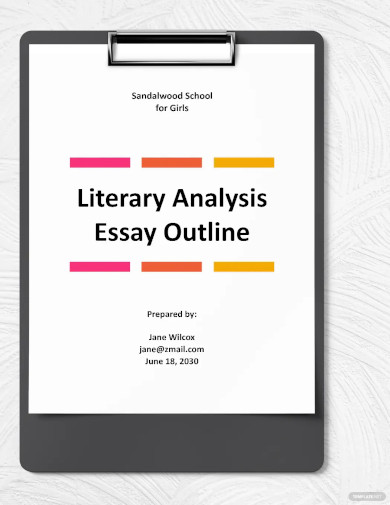
- Google Docs
2. Quotation Literary Analysis Essay Example
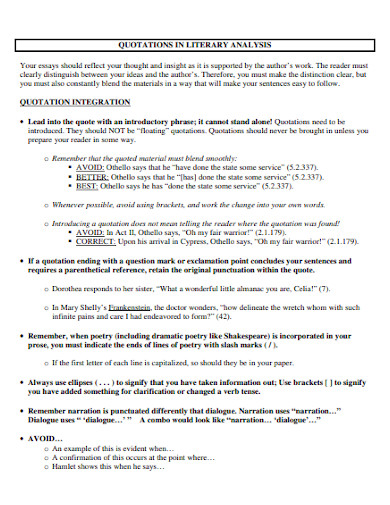
Size: 33 KB
3. Printable Literary Analysis Essay Example
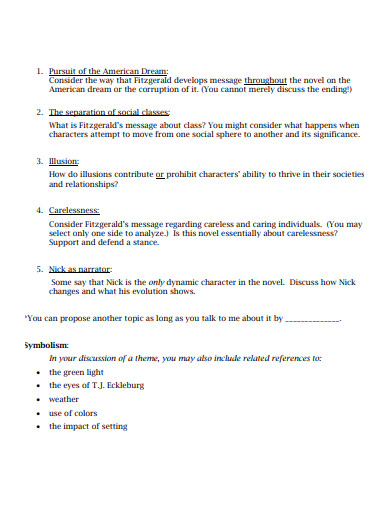
Size: 252 KB
4. Building a Literary Analysis Essay Example
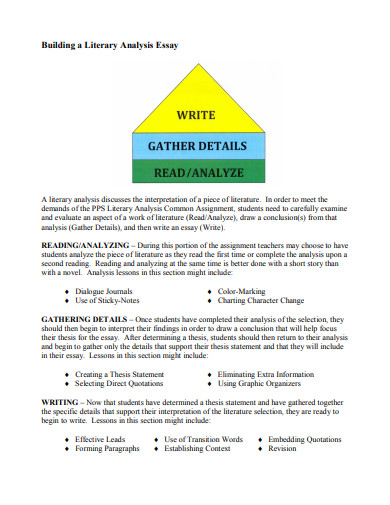
Size: 195 KB
5. Literary Analysis Essay Score Sheet Example
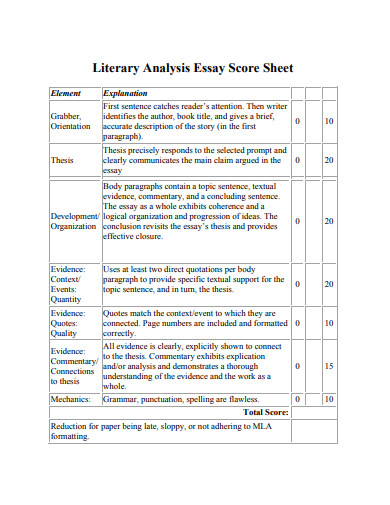
Size: 81 KB
6. Sample Literary Analysis Essay Example
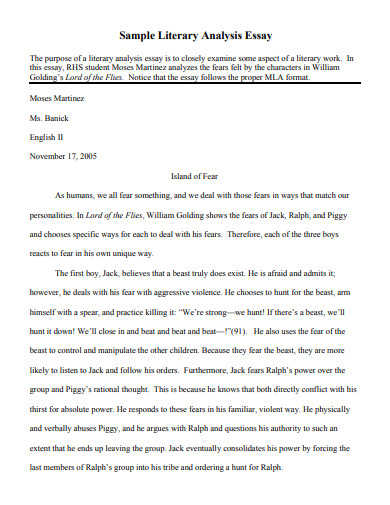
Size: 63 KB
7. Literary Analysis Essay Checklist Example
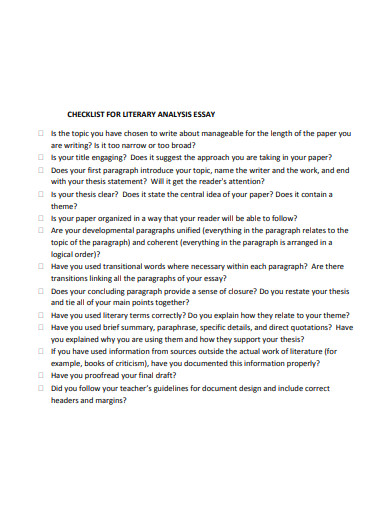
Size: 180 KB

8. Literary Analysis Essay Outline Example
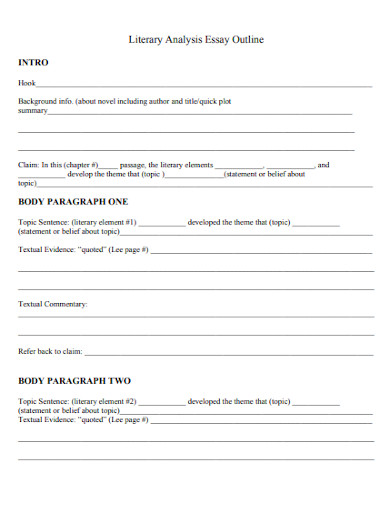
Size: 51 KB
9. Editable Literary Analysis Essay Example
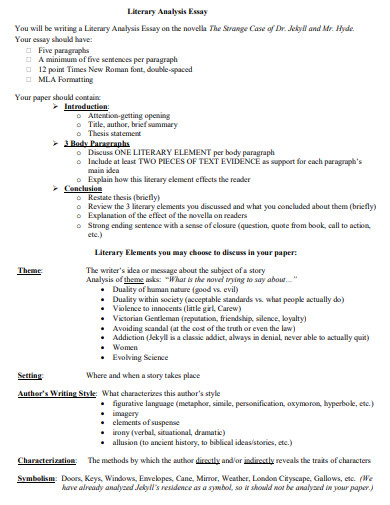
Size: 336 KB
10. Peer Editing Literary Analysis Essay Example
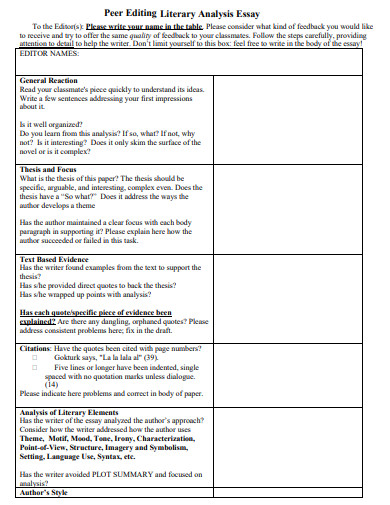
Size: 226 KB
11. Professional Literary Analysis Essay Example
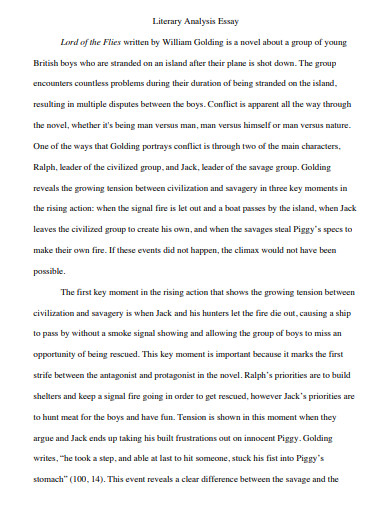
Size: 41 KB
12. Literary Analysis Assessment Outline Essay Example
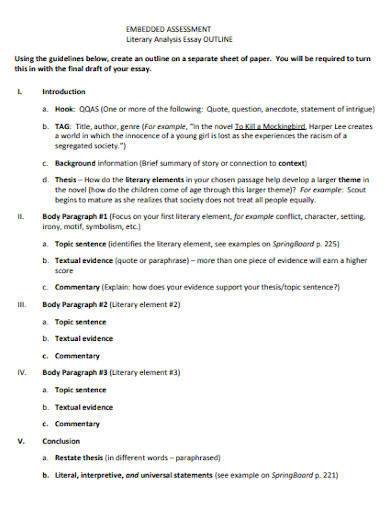
Size: 61 KB
13. High School Literary Analysis Essay Example
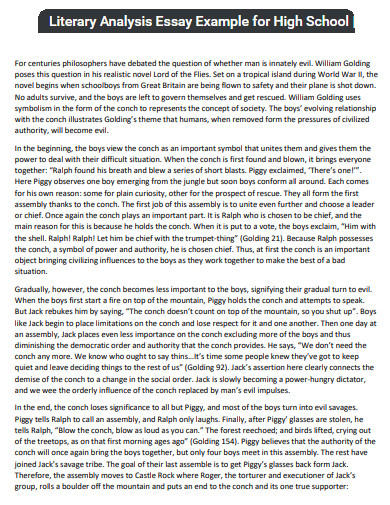
Size: 95 KB
14. Evaluation of a Literary Analysis Essay Example
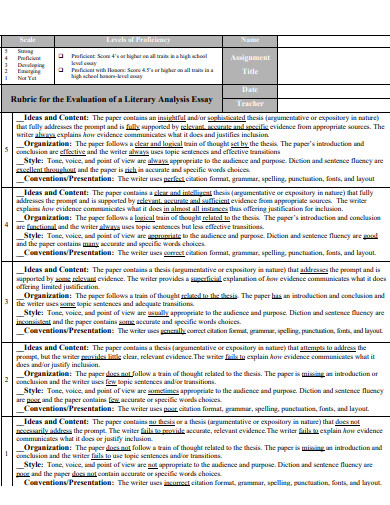
Size: 22 KB
15. Graphic Organizer Literary Analysis Essay Example
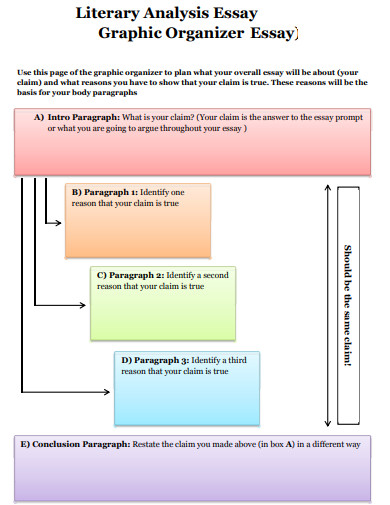
Size: 306 KB
16. Literary Analysis Essay Structure Example
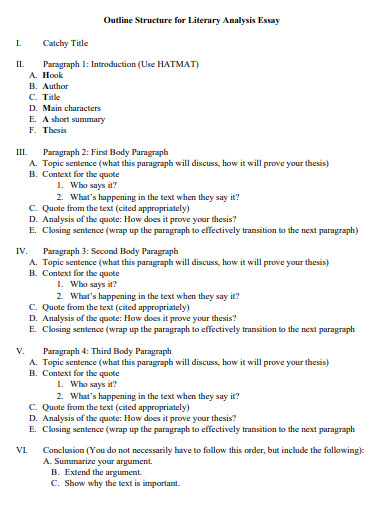
Size: 178 KB
17. Literary Analysis Essay Writing Example
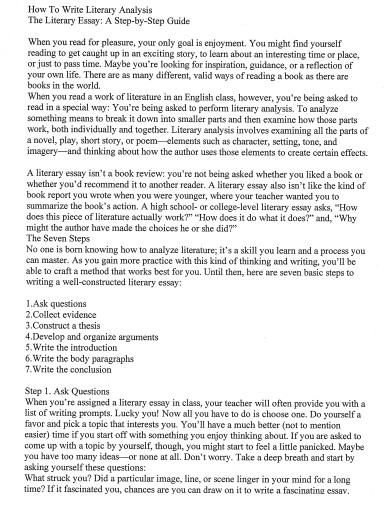
18. College Literary Analysis Essay Example
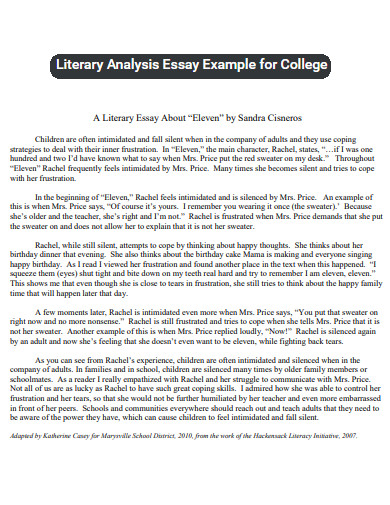
Size: 468 KB
19. Literary Analysis Essay Rubic Example
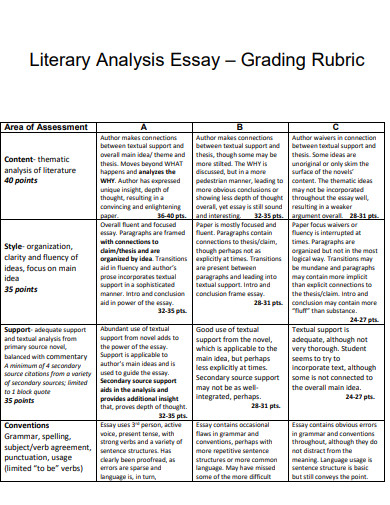
Size: 644 KB
20. Simple Literary Analysis Essay Example
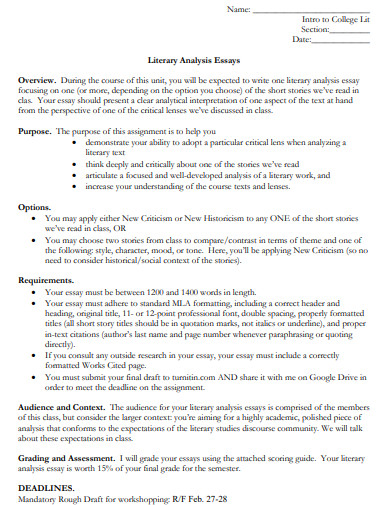
Size: 88 KB
21. Writing a Literary Analysis Essay Example
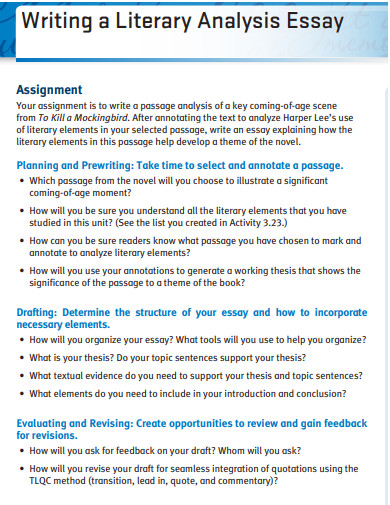
Size: 500 KB
22. Introduction to Literary Analysis Essay Example
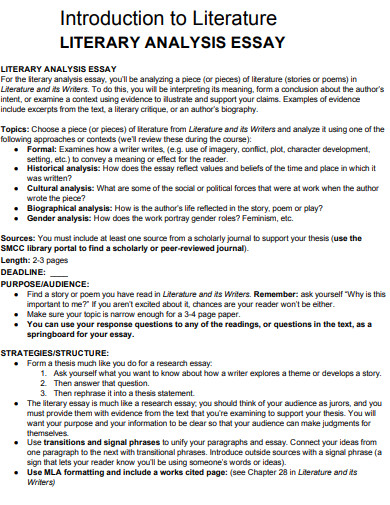
Size: 368 KB
23. Short Story Literary Analysis Essay Example
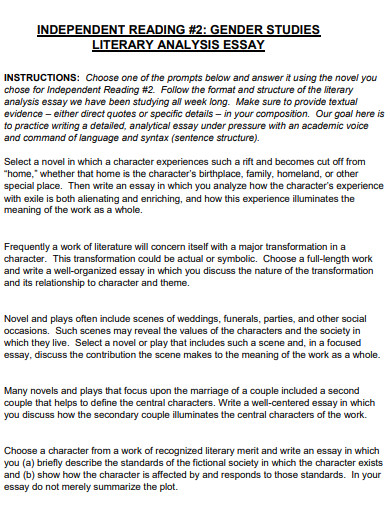
Size: 103 KB
24. 8th Grade Literary Analysis Essay Example
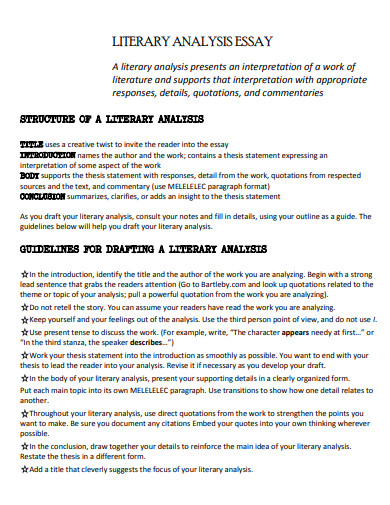
Size: 278 KB
25. Literary Analysis Essay Assignment Example
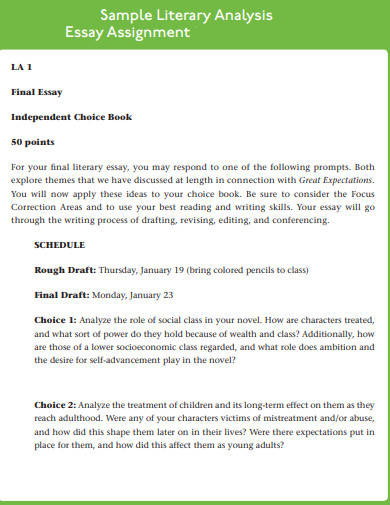
Size: 47 KB
26. Literary Analysis Video Essay Example
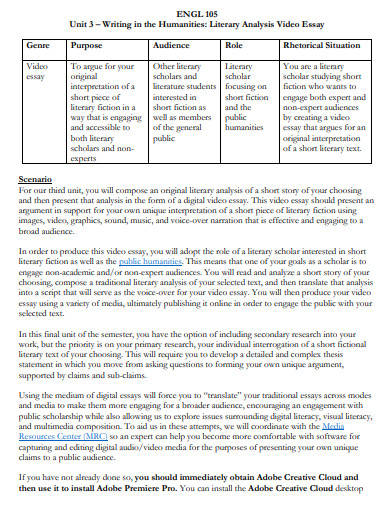
Size: 208 KB
27. Student Guide for Literary Analysis Essay Example
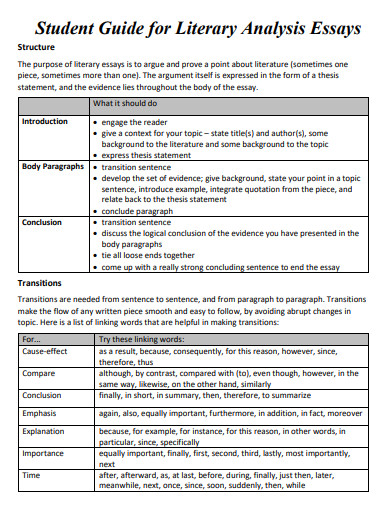
Size: 956 KB
28. MLA Literary Analysis Essay Example
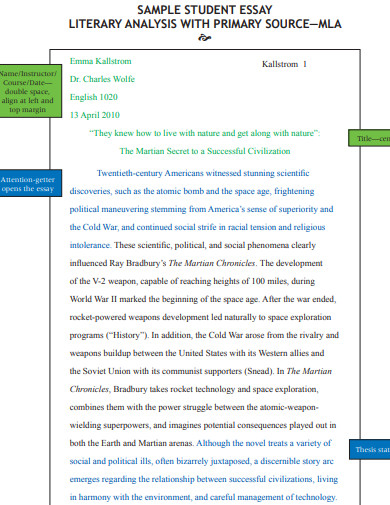
Size: 116 KB
29. Draft Literary Analysis Essay Example
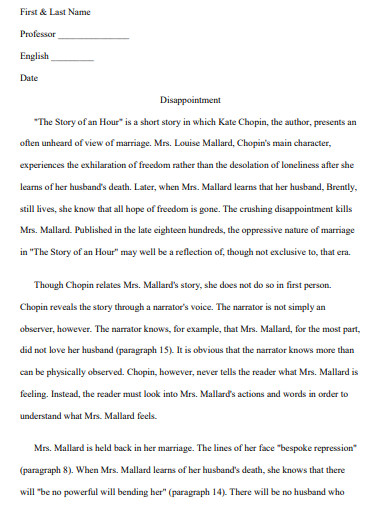
Size: 112 KB
30. 9th Grade Literary Analysis Essay Example
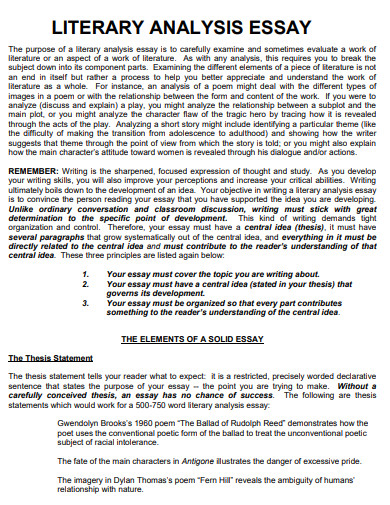
Size: 93 KB
31. Literary Analysis Essay Guide Example
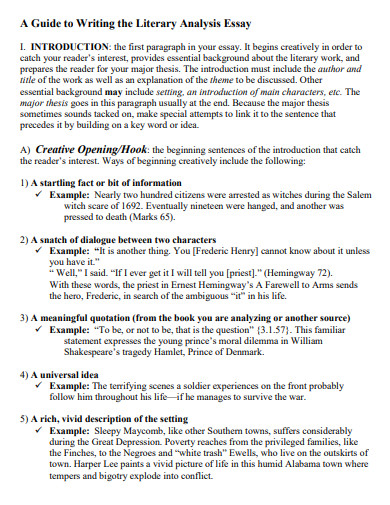
Size: 36 KB
What is a Literary Analysis Essay?
A literary analysis essay is a critical examination and interpretation of a literary work. It involves analyzing various elements such as plot, characters, themes, and literary devices to uncover deeper meanings and insights. By dissecting the text and exploring its nuances, readers can gain a deeper appreciation for the author’s intentions and the work’s impact. A well-written literary analysis essay provides a comprehensive analysis that goes beyond surface-level observations.
How to Write a Literary Analysis Essay
Before we dive into the examples, let’s outline the steps involved in writing a literary analysis essay:
Step 1: Choose a literary work:
Select a literary work that you want to analyze. It could be a novel, short story, poem, or play. Ensure that the chosen work is rich in literary elements and offers ample material for analysis.
Step 2: Familiarize yourself with the work:
Read the literary work carefully, taking note of important plot points, characters, themes, and literary devices. Pay attention to the author’s writing style and the overall tone of the work.
Step 3: Develop a thesis statement:
Craft a strong thesis statement that encapsulates your main argument or interpretation of the literary work. Your thesis should be clear, concise, and debatable, providing a roadmap for your analysis.
Step 4: Gather evidence:
Collect evidence from the literary work to support your thesis statement. Look for specific examples, quotes, and literary devices that reinforce your analysis. Take note of the context in which these elements appear.
Step 5: Organize your essay:
Create an analysis paper outline to structure your essay effectively. Divide your essay into introduction, body paragraphs, and conclusion . Each body paragraph should focus on a specific aspect of your analysis, supported by evidence.
Step 6: Write your essay:
Start with an engaging introduction that provides background information and introduces your thesis statement. In the body paragraphs, analyze different aspects of the literary work, providing evidence and explanations. Ensure a smooth flow between paragraphs. Conclude your essay by summarizing your main points and reinforcing your thesis .
What are some examples of literary devices?
Literary devices are techniques used by authors to enhance their writing and convey meaning. Examples include metaphors, similes, personification, alliteration, and symbolism. For a comprehensive list and explanations, refer to Literary Devices .
Are there any specific examples of short story analysis essays?
You can find examples of short story analysis essays in PDF format here . These examples provide insights into analyzing the elements of a short story effectively.
How does context impact literary analysis?
Context plays a crucial role in literary analysis as it helps readers understand the historical, social, and cultural background in which the literary work was written. It provides insights into the author’s intentions and influences the interpretation of the text.
Literary Analysis Essay Generator
Text prompt
- Instructive
- Professional
Analyze the theme of courage in a novel for your Literary Analysis Essay.
Write about the use of symbolism in a short story for your Literary Analysis Essay.

IMAGES
VIDEO
COMMENTS
3. Body: The body of your paper should logically and fully develop and support your thesis. a. Each body paragraph should focus on one main idea that supports your thesis statement. b. These paragraphs include: i. A topic sentence - a topic sentence states the main point of a paragraph: it serves as a mini-thesis for the paragraph.
The term regularly used for the development of the central idea of a literary analysis essay is the body. In this section you present the paragraphs (at least 3 paragraphs for a 500-750 word essay) that support your thesis statement. Good literary analysis essays contain an explanation of your ideas and evidence from the text (short story,
Heather Ringo & Athena Kashyap. City College of San Francisco via ASCCC Open Educational Resources Initiative. Table of contents. Example 1: Poetry. Example 2: Fiction. Example 3: Poetry. Attribution. The following examples are essays where student writers focused on close-reading a literary work.
Table of contents. Step 1: Reading the text and identifying literary devices. Step 2: Coming up with a thesis. Step 3: Writing a title and introduction. Step 4: Writing the body of the essay. Step 5: Writing a conclusion. Other interesting articles.
Paragraph 1: Introduction to the literary work and its context. Paragraph 2: Analysis of the work's major themes and motifs. Paragraph 3: Examination of the author's writing style and literary techniques. Paragraph 4: In-depth analysis of specific literary devices used in the work.
Discovering Evidence for a Literary Analysis Essay, Fall 2014. 2 of 6. meaning of a literary work. This handout focuses on how to write an explication essay because explication is the foundation for literary analysis, whether the essay be a critical argument or an explication. Literary analysis begins with a study of form and effect.
Microsoft Word - Literary analysis.rtf. The purpose of a literary analysis essay is to carefully examine and sometimes evaluate a work of literature or an aspect of a work of literature. As with any analysis, this requires you to break the subject down into its component parts. Examining the different elements of a piece of literature is not an ...
The Basics of Literary Analysis Writing. Before diving into the specifics of the outline, let's grasp the fundamental elements of a literary analysis essay.. At its core, this type of essay requires a thoughtful examination and interpretation of a literary work. Whether it's a novel, poem, or play, the aim is to analyze the author's choices and convey your insights to the reader.
A literary analysis is a critical analysis of a work of literature such as a poem, a play, a short story or a novel. A literary analysis starts with careful reading and examination of certain parts of the story in order to understand the whole story better. The analysis may focus on literary elements such as setting, character, plot and theme.
Clear topic sentence - make sure it relates to your writing task. Sample topic sentence: "Some people in this society have positive attitudes toward the lottery. Give explanation, examples, and quotes from the story to support your ideas: "Old Man Warner accepts the lottery without question because he believes in the power of tradition ...
Literary analysis involves examining all the parts of a novel, play, short story, or poem—elements such as character, setting, tone, and imagery—and thinking about how the author uses those elements to create certain effects. A literary essay isn't a book review: you're not being asked whether or not you liked a book or whether you'd ...
Sample Literary Analysis Essay. The purpose of a literary analysis essay is to closely examine some aspect of a literary work. In this essay, RHS student Moses Martinez analyzes the fears felt by the characters in William Golding's Lord of the Flies. Notice that the essay follows the proper MLA format. personalities. In Lord of the Flies ...
Outlining Basics. The purpose of an outline is twofold: first, to help you organize your ideas. Second, to help readers follow along with your ideas. Think of an outline as a map for your essay. An essay without some kind of structure often flounders because readers get lost. The following are basic principles of essay organization that should ...
Literary Research Paper Structure (A loose outline to follow)* I. Introduction A. Catches the reader's attention B. Indicates topic and narrows it C. Leads towards the body- sets the stage D. Has a strong, very specific thesis statement 1. Limits what you will write about a) If about an author, names the author and works to be explored
LITERARY ESSAYS The Writing Centre Department of English 1 The field of literature is rich with conversations about books and their authors, stories and characters, and great themes that return in different literary works. Writing a literature essay is your chance to participate in those conversations! Remember that writing is a process.
Explore a collection of 30+ literary analysis essay examples in Word, Google Docs, and PDF formats. Learn how to analyze literature effectively, understand literary devices, create a strong thesis, and provide a comprehensive conclusion. Discover the importance of context, analogies, and literature reviews in crafting a well-rounded analysis.
A thesis in a literary analysis or literary research paper can take many forms. The thesis statement is one of the (if not the) most important parts of your paper. Think ... essay will discuss. Further examples: Samuel Beckett's Endgame reflects characteristics of Theatre of the Absurd in its minimalist stage setting, its seemingly ...
weakest evidence. Only the strongest evidence will be used in your essay outline. WRITING A LITERARY ANALYSIS (SYNTHESIS ESSAY) Now that you have the evidence, your job is to construct a well -formed argument (in the form of a literary analysis) in the same way that a lawyer must build a case to defend a client. ALWAYS, ALWAYS, OUTLINE YOUR ESSAY!
Writing the Essay • Teach the elements of a Literary Analysis Essay as outlined on page 11. • Complete the T-Q-A for the novel. Make sure students use "looping" as described on page 13. After getting some preliminary thoughts on paper, have them write a thesis using the handout on page 14.
Restate the three main points of your essay: (These are the three topic sentences from your body paragraphs, and should be said different to remind the. Restate your claim in a different way: (You can take this from box E on page 1) Final statement about why your claim is important: (This is the "so what" or "what now" explanation of ...
Sample+Literary+Analysis+Essay+Outline - Free download as PDF File (.pdf), Text File (.txt) or read online for free. Scribd is the world's largest social reading and publishing site.